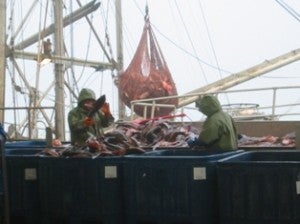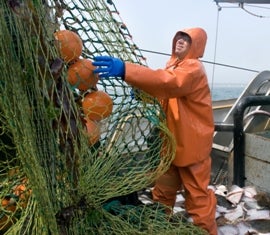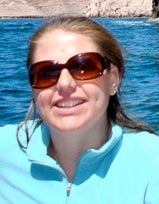EDF’s Oceans program team is comprised of knowledgeable people with a wide range of experience in fisheries, marine sciences and oceans policy. In continuing with our spotlight on EDF’s passionate and talented Oceans staff, we invite you to learn a little more about our New England and Mid-Atlantic Regional Director, Julie Wormser.

Julie Wormser, New England & Mid-Atlantic Regional Director for EDF Oceans program.
Where are you from?
I was born in Salem and have lived in Massachusetts all but a few years of my life. I grew up three blocks from the ocean in Marblehead and as a kid played among the now-gone fishing shacks near Fort Sewall. I grew up with two brothers and multiple official and unofficial foster kids my parents took in to live with us. My mom was kind of a freelance social worker before she finally became one for real when I was in high school.
What did you study in college?
I started out studying forestry and agriculture at Sterling College in northern Vermont. I finished up my bachelor’s degree in biology at Swarthmore College. Just a few years ago I went back to school to get a Masters in Public Administration at the Kennedy School of Government.
What do you do at Environmental Defense Fund?
I manage the Oceans program for the New England and Mid-Atlantic regions. I lead a team of tremendously talented, thoughtful people with backgrounds in marine biology, public policy, law, business and communications. The team is focused on making sure catch shares are designed and set up well. We work predominantly with New England fishermen and fishery managers to find out what goals are most important to them. We organize fishermen’s exchanges with colleagues in other regions so they can work with their peers on identifying successful policy options to achieve their goals.
EDF studies the nearly three hundred catch shares currently in operation worldwide and works to bring those lessons learned back to New England. For example, we are supporting efforts by the New England Fishery Management Council to protect small-scale fishermen and smaller ports by placing accumulation caps on groundfish species to limit the amount of quota any individual can hold. We’d also like to see more explicit ownership requirements put on quota so that the benefits of the catch shares stay within New England fishing communities.
What is something you’ve done at EDF that you are really proud of?
It’s a really tough time for many groundfish fishermen in New England right now. Half the fleet has gone under since the late 1990s under current regulations. Now, just as fishermen are working to learn how to fish under a new catch share system called “sectors,” the amount of fish they are allowed to catch is being reduced significantly.
My team spends most of our time working to reduce costs and improve revenues for New England fishermen who are transitioning to catch shares. We have been helping some groundfish sectors with business planning to improve their bottom lines during the next few years while annual catch limits are low. We also spend a lot of time in Washington lobbying for federal funding to cover the costs of transitioning to catch shares. The Obama Administration’s budget for 2011 contains nearly $23 million for the New England groundfish industry; we want to make sure that funding makes it all the way through the federal budget process so that it can directly support fishermen’s jobs next year as they navigate the transition to sectors.
If catch shares are so effective, then why is there controversy surrounding their implementation?
The truth is that fishermen, managers and non-profit conservation groups agree on a lot more than you would think. You have to compare catch shares to the alternatives. The current system of days-at-sea and daily trip limits in New England has been a failure. Other regions have more often used hard catch limits without allocations; this invariably leads to dangerous, wasteful derby fisheries. We have decades of experience with alternatives to catch shares: more closures, more fluctuations in harvest levels, lower trip limits, more bycatch and ultimately fewer jobs.
Any management system needs to be designed well and catch shares are no different. Groundfishermen and agency staff have worked incredibly hard over the last year to get sectors ready to go on May 1st. Everyone recognizes that there’s more work to do to improve the system once it’s up and running. But we’ve checked in repeatedly with sector managers over the last year and hear again and again that they’d rather keep moving forward under sectors than have to continue to fish under days-at-sea another year.
Aren’t there already catch shares in New England?
Although groundfish sectors are by far getting the most attention and resources, approximately five percent of the sea scallop industry just started fishing under a catch share as of March 1st. Groundfish sectors arose out of a smaller industry initiative in Cape Cod that was approved in 2003.
Over the last few years, the number of state and federal fisheries moving to catch shares has significantly increased. Rhode Island, for example, adopted a pilot sector for summer flounder that started operating in 2009. The results were excellent—the sector stayed under their total allowable catch, they spent less and made more than they had for the same harvest in past years, and they had almost no bycatch and remained fishing throughout the year while the rest of the fleet had considerably higher bycatch and was shut down in the summer.
This year twice the number of fishermen petitioned the state to be included in the summer flounder sector as last year. One Rhode Island fisherman remarked on how fun it was to fish because he finally got to use his knowledge and skills to sometimes-avoid, sometimes-target summer flounder depending on his own business strategy: “It put a spring back in my step.”
What’s something that piques people’s interest when they hear it about you?
I have a twin brother who is nearly a foot taller than I am. My mother’s family has lived in New England for almost 400 years. I don’t have any depth perception; I regularly accidentally bump into my poor husband and daughter.



